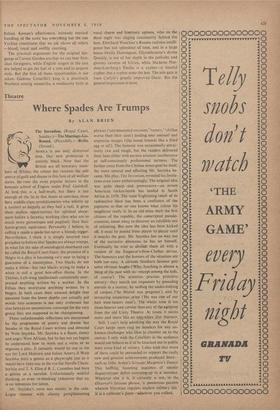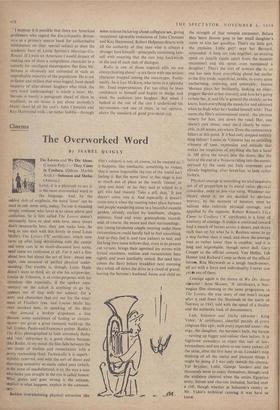Theatre
Where Spades Are Trumps
By ALAN BRIEN The Invention. (Royal Court,
et Sunday.)—The Marriage-Co- Round. (Piccadilly.)—Rello. (Strand.)
AFiticA is our only distressed area. Our new proletariat is entirely black. Now that the British are all honorary mem- bers of Whites, the colour bar remains the sole source of guilt and shame in this best of all welfare states. So runs the most popular lecture in the honours school of Engsoc under Prof. Gaitskell. At best this is a half-truth, but there is just enough of the lie in this thesis to convince those fiery middle-class revolutionaries who whistle up a tumbril as happily as they hail a taxi. It gives them endless opportunities for spiritual abase- ment before a faraway working class who are so much more picturesque and pugilistic than their home-grown equivalent. Personally I believe in calling a spade a spade but never a bloody nigger. Nevertheless, I think it is simply inverted race prejudice to believe that Spades are always trumps. In what for the sake of sociological shorthand can be called the Royal-Court foyer, the presence of a Negro in a play is becoming very near to being a guarantee of a masterpiece. Two blacks do not make a white—but two blacks trying to make a white is still a good box-office theme. In the Thirties, Left-wing intellectuals consistently over- praised anything written by a worker. In the Fifties they overpraise anything written by a Negro. In both cases their amazed delight that someone from the lower depths can actually put words into sentences is not only irrelevant but also betrays an unconscious contempt for the very group they are supposed to be championing.
These unfashionable reflections are occasioned by the programme of poetry and drama last Sunday at the Royal Court written and directed by Wole Soyinka. Mr. Soyinka is a fluent, funny and angry West African, but he has not yet begun to understand how to work out a verse or to organise a play. It certainly would be one in the eye for Lord Malvern and Julian Amery if Wole Soyinka were a genius as a playwright just as it would have been one in the eye for Neville Cham- berlain and T. S. Eliot if B. L. Coombes had been a genius as a novelist. Unfortunately wishful thinking, or even 're-thinking' (whatever that is), is no substitute for talent.
Mr. Soyinka's verse was mainly in the cata- Logue manner with clumsy pamphleteering
phrases ('untransmuted emotion,' venery."chillun worse than their sires') leading into unusual and unprecise images ('the moon bounds like a fried egg in oil'). The humour was occasionally attrac- tively raw and tough, but the readers delivered their lines either with earnest amateur incoherence or self-consciously professional tartness. The farther away from the Chelsea street-poet he went. the more natural and affecting Mr. Soyinka be- came. His play. The Invention, revealed his limita- tions even more embarrassingly. The original idea was quite sharp and provocative—an errant American rocket-bomb has landed in South Africa in 1976. The most frightening result of its radioactive blast has been a confusion of the pigments so that no one knows what Colour his neighbour really is. In an old mine shaft the first citizens of the republic, the conscripted pseudo- scientists, sweat away to discover an infallible test of colouring. But now the idea has been kicked off, it must be passed from player to player until it smacks the goal. Mr. Soyinka has no way out of the narrative dilemmas he has set himself. Eventually he tries to abolish them all with a version of the Emperor's-New-Clothes device. The humours and the horrors of the situation are both too easy. A cartoon Southern Senator gets some obvious laughs ('Why, lynching is almost a thing of the past with us—except among the kids, of course'). The scientists practise primitive sorcery—they search out impostors by pounding entrails in a mortar, by sniffing the underclothing of corpses (`So Muriel was pregnant'), and by savouring suspicious urine ('He was one of our best wine-tasters once'). The whole tone is ten times heavier and cornier than any of the agitprop from the old Unity Theatre. At times, it seems more and more like an anti-white Der Stiirtner.
Still. I can't help admiring the way the Royal Court keeps open ring on Sundays for any un- known challenger who likes to clamber on to the canvas. I only wish the Courtiers in the audience would not behave as if to be knocked out in public were some kind of victory. I also wish that more of them could be persuaded to support the really new and genuine achievements produced there— such as John Arden's Serjeant Musgrave's Dance. This baffling, haunting sequence of sinister daguerrotypes defies summing-up in a sentence. Whatever else it is, it certainly is not, in the Observer's fatuous phrase, 'a ponderous parable wherein Victorian regulars explain military life.' It is a collector's piece—whatever you collect. " I suppose it is possible that there are American professors who regard the Encycloptedia Briton- idea as a primary source book for authoritative information on their special subject as does the academic hero of Leslie Stevens's Marriage-Go- Round. If I were an American I would despair of making one of them a sympathetic character in a comedy for intelligent theatregoers. But then Mr. Stevens is obviously not interested in such an unprofitable minority of the population. He is out to flatter and titillate that wine-logged, food-dazed majority of after-dinner laughers who think the very word 'anthropology' is worth a titter. Mr. Stevens is barely a paragraph ahead of them in erudition, so no strain is put about anybody's brain—least of all the cast's. John Clements and Kay Hammond walk—or rather hobble--through some tedious bickering about collegiate sex, giving occasional agreeable imitations of John Clements and Kay Hammond. Robert Hetpman directs with all the authority of that man- who is always a stranger here himself—principally contenting him- self with ensuring that the cast leap backwards at the end of each slab of dialogue.
Rollo is one of those sugared pills we are always hearing about—a sex farce with one serious character trapped among the stereotypes. Fortu- nately, he is Leo McKern, who turns in a splendid Mr. Toad impersonation. Far too often he loses confidence in himself and begins to nudge and wink the audience into laughter. But when I looked at the rest of the cast I understood his nervousness—not one of them, in my opinion. above the standard of good provincial rep.







































 Previous page
Previous page